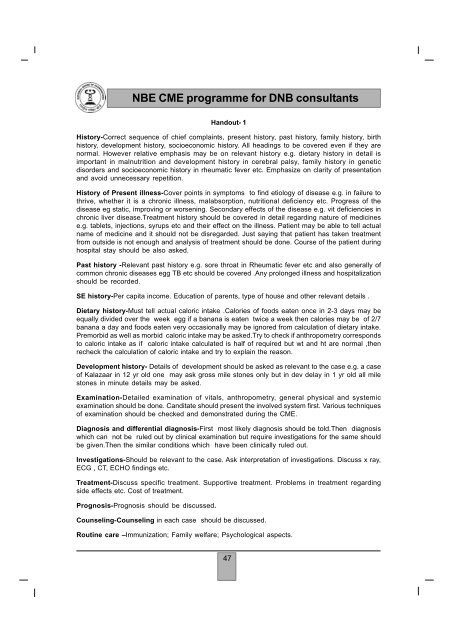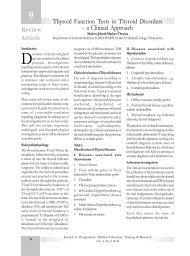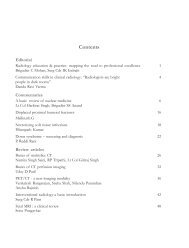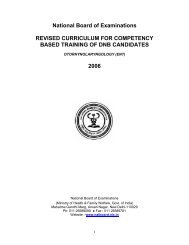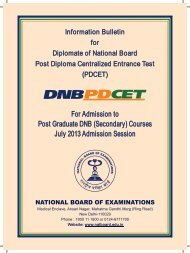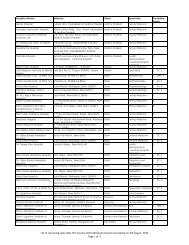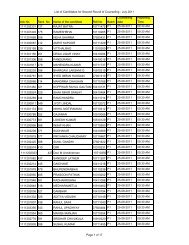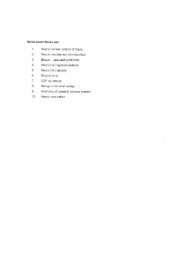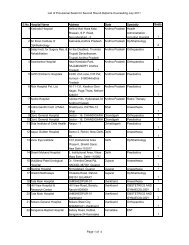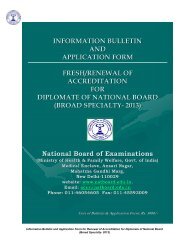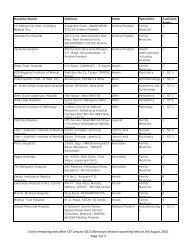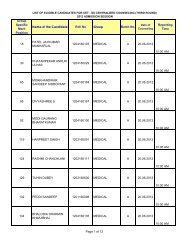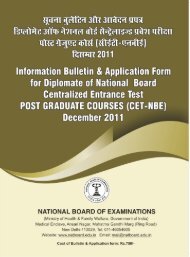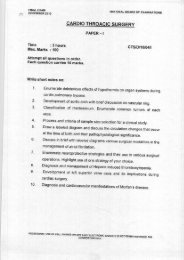NBE CME programme for DNB consultants - National Board Of ...
NBE CME programme for DNB consultants - National Board Of ...
NBE CME programme for DNB consultants - National Board Of ...
Create successful ePaper yourself
Turn your PDF publications into a flip-book with our unique Google optimized e-Paper software.
<strong>NBE</strong> <strong>CME</strong> <strong>programme</strong> <strong>for</strong> <strong>DNB</strong> <strong>consultants</strong>Handout- 1History-Correct sequence of chief complaints, present history, past history, family history, birthhistory, development history, socioeconomic history. All headings to be covered even if they arenormal. However relative emphasis may be on relevant history e.g. dietary history in detail isimportant in malnutrition and development history in cerebral palsy, family history in geneticdisorders and socioeconomic history in rheumatic fever etc. Emphasize on clarity of presentationand avoid unnecessary repetition.History of Present illness-Cover points in symptoms to find etiology of disease e.g. in failure tothrive, whether it is a chronic illness, malabsorption, nutritional deficiency etc. Progress of thedisease eg static, improving or worsening. Secondary effects of the disease e.g. vit deficiencies inchronic liver disease.Treatment history should be covered in detail regarding nature of medicinese.g. tablets, injections, syrups etc and their effect on the illness. Patient may be able to tell actualname of medicine and it should not be disregarded. Just saying that patient has taken treatmentfrom outside is not enough and analysis of treatment should be done. Course of the patient duringhospital stay should be also asked.Past history -Relevant past history e.g. sore throat in Rheumatic fever etc and also generally ofcommon chronic diseases egg TB etc should be covered .Any prolonged illness and hospitalizationshould be recorded.SE history-Per capita income. Education of parents, type of house and other relevant details .Dietary history-Must tell actual caloric intake .Calories of foods eaten once in 2-3 days may beequally divided over the week egg if a banana is eaten twice a week then calories may be of 2/7banana a day and foods eaten very occasionally may be ignored from calculation of dietary intake.Premorbid as well as morbid caloric intake may be asked.Try to check if anthropometry correspondsto caloric intake as if caloric intake calculated is half of required but wt and ht are normal ,thenrecheck the calculation of caloric intake and try to explain the reason.Development history- Details of development should be asked as relevant to the case e.g. a caseof Kalazaar in 12 yr old one may ask gross mile stones only but in dev delay in 1 yr old all milestones in minute details may be asked.Examination-Detailed examination of vitals, anthropometry, general physical and systemicexamination should be done. Canditate should present the involved system first. Various techniquesof examination should be checked and demonstrated during the <strong>CME</strong>.Diagnosis and differential diagnosis-First most likely diagnosis should be told.Then diagnosiswhich can not be ruled out by clinical examination but require investigations <strong>for</strong> the same shouldbe given.Then the similar conditions which have been clinically ruled out.Investigations-Should be relevant to the case. Ask interpretation of investigations. Discuss x ray,ECG , CT, ECHO findings etc.Treatment-Discuss specific treatment. Supportive treatment. Problems in treatment regardingside effects etc. Cost of treatment.Prognosis-Prognosis should be discussed.Counseling-Counseling in each case should be discussed.Routine care –Immunization; Family welfare; Psychological aspects.47


